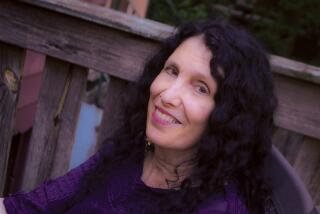In ‘That Kind of Mother,’ Rumaan Alam enters the thorny world of interracial adoption
Even in the most amicable of arrangements, when all the ostensible needs are met, and everyone is healthy and clear-headed, it’s nearly impossible to harness the sedulous nuances of adoption. The cryptic despair and magnanimous ideology surrounding this one singular transaction, which then congeal together to form an entirely different kind of molecular activity other than DNA, is damningly mercurial. But these are, of course, stories that need to be told, nonfiction and fiction alike — the coarse gratification of catharsis and the freedom to imagine what could be, respectively. I suspect there’s a little of both in “That Kind of Mother” by Rumaan Alam, the son of Bangladeshi immigrants, who together with his white husband is raising two adopted black sons in rapidly gentrifying Brooklyn, New York.
“That Kind of Mother,” Alam’s novel following his 2016 bestselling fiction debut “Rich and Pretty,” centers around Rebecca Stone, an attractive white woman in her 30s who lives in a big house in Washington, D.C., with her husband, Christopher, a British diplomat, during the Reagan administration. Rebecca is a well-educated poet who cooks delicious meals in her spacious, well-ordered kitchen, is generally unbothered or casually imperious and has an affinity for Princess Diana. She is, essentially, the very embodiment of white privilege, which would be less grating if she had any real sense of this throughout the novel.
Like many new mothers, after giving birth to her first child, a son named Jacob, Rebecca has trouble getting the hang of breastfeeding, which prompts the services of the hospital liaison from La Leche League, a black woman named Priscilla. The two women don’t form a bond so much as Rebecca decides, when she gets home with the baby and fully realizes the stresses and demands of being a stay-at-home mother, that she needs help, and her desired help is Priscilla. No mind that Priscilla already has a job at the hospital, where her grown daughter Cheryl works as a nurse and had pulled the administrative strings to arrange a job for her mother. But Rebecca is accustomed to having things be a certain way, accustomed to having things period, and as her husband tells her, “The right amount of money makes anything possible.”
Rebecca’s sense of entitlement is not because she is wealthy, although that is part of it, but almost certainly because she is white and can afford the luxury of thinking about race only in terms of prosaic inner musings. It’s not strange to have a nanny or some kind of help if you are a working mother and can afford it, and while poetry is certainly a viable and respectable vocation, it’s fairly clear that Rebecca is not looking for Priscilla to free up writing hours, but rather, to allow her the time to think about herself. Even that wouldn’t be so bad if Rebecca had even a smidge more depth of character, and/or the ability to see Priscilla as something beyond a one-dimensional stereotype: “Because she was full of a certain kind of wisdom, Priscilla seemed much older, but Rebecca sensed this wasn’t the case. Still, she didn’t trust her estimates, because Priscilla’s blackness was a complication. Hair and skin are giveaways, but Rebecca didn’t understand black hair or black skin.”
Surely, Alam did not set out to create an unlikeable character, and there are moments of real vulnerability in Rebecca, when she’s navigating the frantic haze of new motherhood, held emotionally hostage, as we are, by the love for our children — however they come to us. “Becoming Andrew’s mother was neither the least nor the most she could do; it was, simply, what she had done.” And yet, whatever maternal instinct she has stops at exploring or considering race.
Granted, this is pre-Google, but books from the library work too when someone is curious about someone different from themselves. Later, Rebecca ponders whether Priscilla might like the work of poet Nikki Giovanni: “Was she recommending Giovanni because Giovanni was, like Priscilla, a black woman?” This seemed so idiotic but maybe true.” And yet we never find out, because Rebecca never asks Priscilla directly, or follows through on her offer to share some of Giovanni’s poetry.
Rebecca is genuinely fond of Priscilla, and Priscilla, though she clearly considers Rebecca her boss, may well feel a similar fondness in return. But Priscilla’s feelings don’t matter here because Rebecca’s affection toward her as, well, a mammy figure, is paramount to everything else: “Priscilla’s body … that familiar soft hardness, that compact power, that unfussy grace. Priscilla’s femininity was more like a utility.” Then naturally (or unnaturally, if we’re going down that road), Priscilla dies in childbirth, something that is never actually explained; Priscilla is in her early 40s and in seemingly good health.
Coincidentally, Priscilla’s daughter Cheryl, who had recently married and was herself pregnant when her mother died, gives birth a few weeks later and was, not surprisingly, overwhelmed by the whole series of events. No worries. Rebecca has a plan. One that will serve her and, perhaps also, whatever, maybe Cheryl too.
It starts as a temporary arrangement — Rebecca would bring the new baby, Andrew, home with her until Cheryl got her bearings. But really, Rebecca has made the unilateral decision that she will adopt the baby — despite there being no indication whatsoever that Priscilla would want Rebecca to adopt her child if something happened to her.
In the months that follow, during which Rebecca’s husband, Christopher, struggles to reconcile the situation, offering an alternative of financial help for Cheryl and her husband to raise Andrew along with their new daughter, Ivy. An appalling suggestion to Rebecca, who “squeezed the baby closer” upon hearing it, because “[h]e was too young to protest this” — her assumption being that this small black life would prefer to live with this rich white family rather than with his own black family, who may or may not need or want financial help.
Christopher argues for the latter, but Rebecca was going to have this black child no matter what — her own rationale falls somewhere between this being a way to repay Priscilla for helping her become the mother she wanted to be, and her own pure, unadulterated selfishness: “‘This is what I want,’ Rebecca said, and as she said it, knew that she always got what she wanted.”
His is an exceedingly accurate portrait of the many white women who have adopted black children in America.
— Rebecca Carroll on ‘That Kind of Mother’
We traverse several years with Jacob and Andrew growing together as brothers, shared holidays with Cheryl, her husband and daughter at Rebecca and Christopher’s enormous house, sometimes including extended family. Rebecca’s British mother-in-law drops the inevitable racial microaggressions; a white mother at the park asks Rebecca if Andrew is hers, to which she responds, of course, “He’s mine.” Rebecca dreams of “armed policemen entering the house” and “taking Andrew from her arms” but not, say, as a black mother of a black son might dream anxiously, that armed policemen profile him on the street and shoot Andrew dead.
Gradually, we see what it looks like for Rebecca to become the white mother of a black child — through the eyes of a Bangladeshi American gay man raising black adopted children with his white husband in an upper-middle class neighborhood. And the truth is, whether intentional or not, Alam has hit the nail squarely on the head. His is an exceedingly accurate portrait of the many white women who have adopted black children in America, including the legion of white celebrity women, and also my own white adoptive mother, who didn’t understand how to care for my skin, my hair; how to accept and prepare for the unavoidable racism I would encounter and didn’t ask or research or pursue how to raise a black child in black culture.
Rebecca thinks about blackness and race peripherally — she entertains abstract thoughts, and applauds herself for doing so, while remaining wildly ignorant: “She placed a hand on top of his hair, so thick and curly that sometimes, after his bath, she’d discover that his scalp was still dry, untouched by the water she’d poured over the top of him.” Even as Cheryl, who goes along with the arrangement until she can’t, tries to explain to Rebecca what it means to be the parent of a black son in America — eh, Rebecca’s got it covered: “The life Andrew’s going to have, it’s not going to be the way your life was. Not the way Priscilla’s life was.” And, you know, really this is just obtuse on Rebecca’s part. Studies show (provided, two decades later) that no matter or wherever black boys are raised or educated, they still get screwed — especially when it comes to wealth.
“That Kind of Mother” is ultimately about Rebecca — the kind of white mother who loves the idea of being a poet, of being compassionate, of saving a black child from what she presumes to be the less fortunate circumstance of growing up around other black people. The story is never once about Andrew, whose life is simultaneously the most fragile and resilient, and from which we could have learned a great deal about interracial adoption and the complications of black identity in white spaces had it been fully realized.
This, though, is why Alam’s novel is so important. “That Kind of Mother” offers a blueprint for how not to be a white mother of a black child, while also, to a careful reader, prompting questions for prospective white adoptive parents of black children. And more broadly speaking, what does it tell us that a gay brown adoptive father of two black children chose to tell the story of interracial adoption by centering it on the experience of a white woman?
We all make and define family in different ways, but those of us who are parenting black children cannot forget that we are preparing them to go out into a world founded upon ripping black families apart.
Carroll is a producer of special projects on race at WNYC, the author of five nonfiction books and one of the Times’ Critics at Large.
::
Rumaan Alam
Ecco: 304 pp., $26.99
More to Read
Sign up for our Book Club newsletter
Get the latest news, events and more from the Los Angeles Times Book Club, and help us get L.A. reading and talking.
You may occasionally receive promotional content from the Los Angeles Times.







